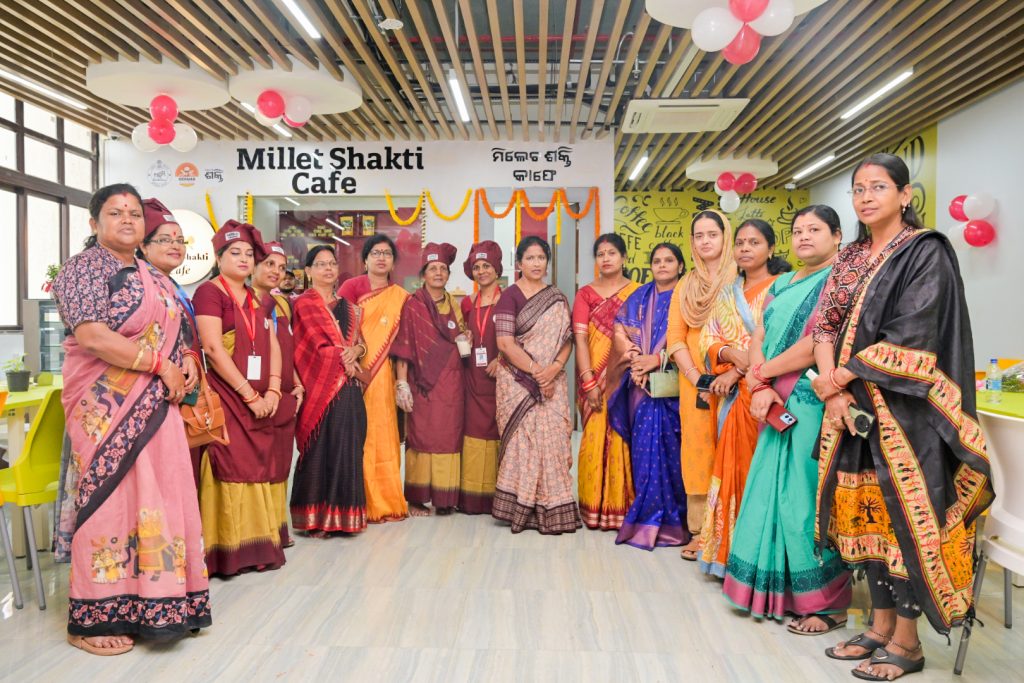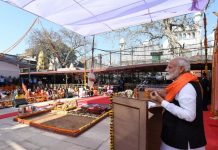Odisha’s Millet Shakti cafes and outlets are 21 in number, of which seven are in the capital
city Bhubaneswar. The first set up was planned in the tribal-dominated
Keonjhar district. A report by Deepanwita Gita Niyogi

Before her café was inaugurated, Debjani Das only knew about ragi or finger millet cultivated on a large-scale in Odisha. “As this millet is common in my state, many people know about it. But now apart from ragi, I am aware about other millets as well. It is amazing how such a wide range of food items can be prepared from millets. At one time, it was frankly beyond my imagination.”
Debjani’s Millet Shakti Café was launched in Bhubaneswar in March this year. Run by a few women from 8 a.m. to 10.30 p.m. daily, the café, located near a prominent bus stand in the state capital, serves both hot food and value-added items to customers.
Items are priced as low as Rs 10, and the rate goes up to touch Rs 150 for the delicious chicken biriyani made from kodo millet. Millet dosa and idli are much in demand at the cafe. Vada and samosa also sell fast. In value-added items, customers can choose from laddoo, murukku and mixture which are ideal as snacks.
Besides Debjani’s café, there are four other Millet Shakti Cafes in Bhubaneswar which are run by women. There are two outlets. “Through these cafes situated at strategic areas, the idea is to popularise millet-based foods and empower women at the same time,” said Anurag Tripathi of Wassan. The organisation works with the Odisha government to promote millets.
“The idea was that when people visit these cafes and outlets, they will invariably try out millet food items. As part of the mission, there is a plan to set up one millet cafe in each prominent location of Bhubaneswar,” Tripathi added.
On his part, Tripathi looks after the Millet Shakti Cafes, which come under Millet Shakti. At present, there are 21 cafes and outlets across the state. The first such enterprise was set up in the tribal-dominated Keonjhar district.
Millet revolution– Millets, which are ancient grains rich in nutrition, can withstand climate variability. But in the past five decades, emphasis was put on market-driven crops like paddy and wheat to achieve India’s food security which reduced the coverage under millets.
The Government of Odisha launched an initiative in 2017 for promoting millets in the state’s vast tribal areas to secure nutrition and revive millets in farms and on plates. It is known as the Special Programme for Promotion of Millets in Tribal Areas of Odisha or the Shree Anna Abhiyan. At present, the programme covers 14654 villages in 177 blocks across 30 districts of the state.
In Odisha, the millet cafes are getting a boost through Millet Shakti which is a collaboration between Shree Anna Abhiyan and Mission Shakti. Overall, Mission Shakti aims at women’s safety, security and empowerment.
Women’s self-help groups (SHGs) are playing an important role in the promotion of millet entrepreneurship and consumption. Debjani’s SHG, Radha Rani, formed in 2017, is part of the Trishakti Federation which has 70 SHGs under it. To set up a cafe, each SHG received about Rs 20 lakh.
Women at the forefront– Before Debajani’s café was launched, all the members of her SHG received training in Bhubaneswar around 2017 for a few months. At that time, others groups also received training.
“Back then, I could not imagine that we would be able to come this far. After the training, I practised making various millet-based items at home. My in-laws also encouraged me. They weighed all the materials needed,” Debjani said.
While the hot food items are prepared at the café which caters to about 200 people daily, the responsibility of making the dry items have been delegated to five groups as orders are increasing day by day. Debjani informed that while one group makes the mixture, another prepares laddoos.
Apart from the café, the women also have a millet processing unit, which was set up in 2018. The supply of raw materials comes from Koraput district where a farmer producer organisation has been engaged.
Minati Sabat’s millet outlet near the Kalinga Stadium in Bhubaneswar was inaugurated last year. Earlier, Sabat’s group, Om Sai Ram SHG, used to stitch cloth carry bags which is still on. But the women, 16 in number, now also serve delicious items like millet noodles and millet pakoda. The outlet is open on all seven days.
The millet cafes and outlets have been conceptualised for urban areas. For semi-urban and rural areas, there are tiffin centres and millet on wheels across Odisha.
Apart from the cafes and outlets, the Belgadia Palace in Mayurbhanj district also serves millet recipes to its guests. According to the manager, Soutam Pramanik, some popular items are kheer, vada and dosa, made from millets. Guests also get to taste millet cookies and namkeens which are placed in their rooms. “As millet is a healthy food, we try to include it in our menu.”













